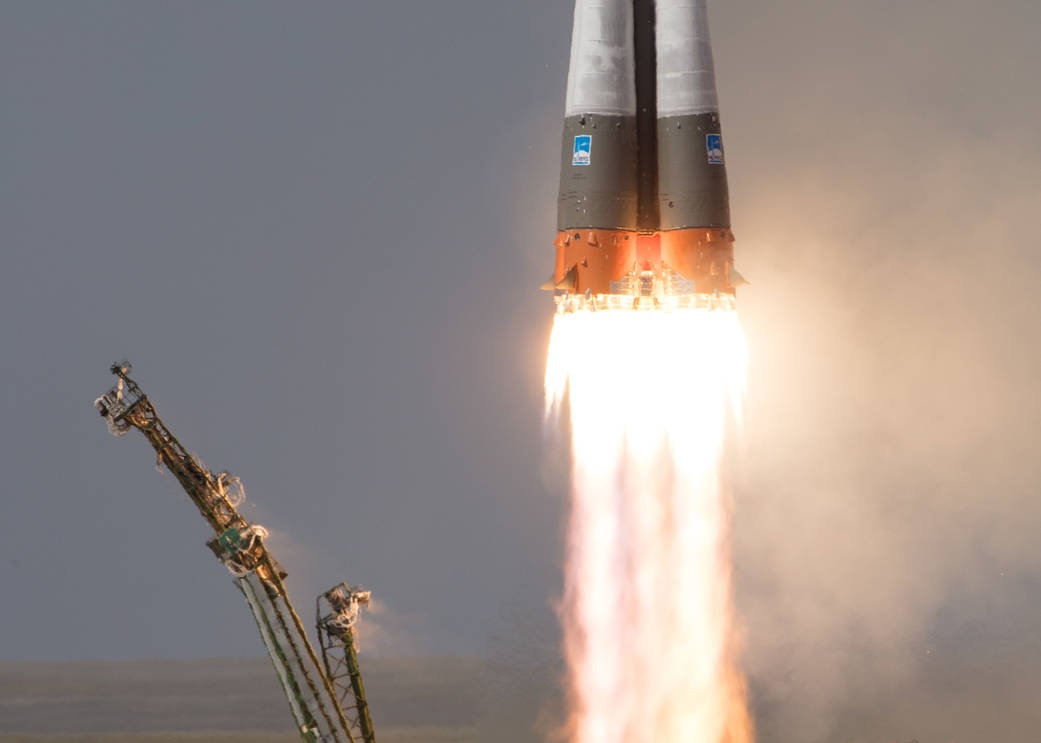A Funny Thing Happened on the Way to the Soyuz Crew Launch

BAIKONUR COSMODROME, Kazakhstan — Waking up from a feverish nap, I carefully rose from my airplane seat. Fellow Canadian journalist Sean Costello noticed I was awake. "I hope you're feeling better, Elizabeth. This is going to get interesting."
So began several hours of diplomatic negotiations as our plane — full of roughly 60 VIPs, journalists and astronaut family members en route to watch the launch of the Expedition 58 crew on a Soyuz rocket here — experienced a forced detour that is extremely rare for these chartered flights. A Russian Soyuz rocket is scheduled to launch three members of the International Space Station's crew into orbit on Dec. 3.
The flight detour came after a cascade of problems. Our departure from Moscow was delayed by two hours by some sort of technical issue. While in the air, the charter airline realized our 757-200 airplane couldn't reach Baikonur's airport before nightfall. (All Soyuz launches fly from the Baikonur Cosmodrome in Kazakhstan.) Usually darkness is no big deal for planes, but Baikonur's runway isn't equipped with lights. [Read about Elizabeth Howell's travels to the Baikonur launch here]
So midway through our 3.5-hour journey, our flight to Kazakhstan became a return to Russian soil and we alighted in Samara, a city some 1,000 km northeast of Moscow. Meanwhile, I was fighting symptoms of the flu or a cold in an airplane that could not be deboarded due to visa complications.
Diplomatic privilege
We never had any real sense of worry. Among the guests on this plane was NASA's Bill Gerstenmaier, one of the top human spaceflight officials at the agency — and a trusted negotiator with the Russian space agency. Multiple NASA employees with diplomatic privileges were also onboard, which gave our plane a bit of a hotline to the authorities to figure out what to do.
Diplomacy was necessary because most people on this plane had double-entry visas. This allows you to visit Russia, leave the country, and then return once within a prescribed amount of time. (In my case, it was 90 days.)
If we deboarded in Samara, we would burn up our second entries into the Russian Federation at a border crossing and miss the chance to go to Kazakhstan altogether. So NASA — being NASA — quickly got on the plane intercom to advise us they were working options.
Breaking space news, the latest updates on rocket launches, skywatching events and more!
Our three choices, as they saw it, were these: to land in the military zone of Baikonur (a zone normally forbidden to civilian aircraft), to get special dispensation to remain in Samara at the airport hotel, or to fly to another town in Kazakhstan and bus it to Baikonur.
Waiting it out
With nothing to do but wait, the mood turned more festive as the flight crew handed out drinks. I slept off my symptoms, with doctors from NASA and the Canadian Space Agency frequently checking in on my health. In between catnaps, I saw VIPs mingling with reporters and, at one point, Canadian astronaut Josh Kutryk came to our area of the plane to chat with an official from CSA. Passengers made phone calls, sharing phones to make sure that everyone could reach who they needed.
The three small children of Canadian astronaut David Saint-Jacques played in the aisles, with the two older ones decked out in astronaut paajamas. A couple of TV reporters filmed their antics as Saint-Jacques' wife, Veronique Morin, kept an eye on the kids. Daylight turned to darkness, and the supper hour came and went.
We got frequent updates, water and (in some cases) a bit of food. After 2 hours, the diplomatic negotiations worked — we would fly to Kyzylorda, Kazakhstan and take a 3-hour bus ride to Baikonur, arriving only 2 hours before the scheduled rocket rollout.
Our plane landed without further incident and, as of this writing, media have arrived at the Seven Winds hotel and are preparing to head to the rocket rollout. The rocket rollout is scheduled for 7 a.m. Dec. 1 local time (8 p.m. EST Nov. 30, or 1 a.m. GMT Dec. 1). If all goes to plan, the liftoff will take place Dec. 3.
This trip to the ISS is the first since a dramatic abort during the Expedition 57 launch Oct. 11. Russian space officials traced the problem to a deformed sensor, allowing the Expedition 58 launch to proceed.
Follow us on Twitter @Spacedotcom and on Facebook. Original article on Space.com.

Elizabeth Howell (she/her), Ph.D., was a staff writer in the spaceflight channel between 2022 and 2024 specializing in Canadian space news. She was contributing writer for Space.com for 10 years from 2012 to 2024. Elizabeth's reporting includes multiple exclusives with the White House, leading world coverage about a lost-and-found space tomato on the International Space Station, witnessing five human spaceflight launches on two continents, flying parabolic, working inside a spacesuit, and participating in a simulated Mars mission. Her latest book, "Why Am I Taller?" (ECW Press, 2022) is co-written with astronaut Dave Williams.
